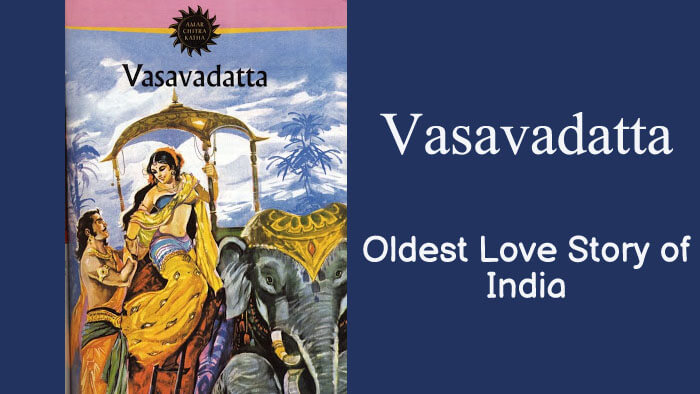Udayana and Vasavadatta – Oldest Love Story of India

Udayana was a prince of lunar race/ Chandra kula. He was the son of Sahasraanika. He was the king of Vatsa and called Vatsaraja. He was the hero of a popular love story, probably the earliest love story in India, a real-life story. Though we have Nala – Damayanti, Sathyavan – Savithri, Krishna – Rukmini, Arjuna – Chitrangada, and other such love stories they all become part of religious literature. Udayana – Vasavadatta’s love affair is from the secular side and more historical.
One more interesting thing is that it has reached the Southernmost part of India and became a hero in Tamil kavya.
Udayana’s capital was Kausambi. He was a great Veena player. Vaasavadataa, the princess of Ujjaiyini, saw him in a dream and fell in love with him. She was the heroine of Subhandhu’s ‘Vasavadatta’.
Here is a piece about her in the Great Women of India.
Vasavadatta the far-famed queen of Udayana is the character where the recognized romantic ideal (sachiva, sakhii, shishya) is brought to the highest level of execution. The features of sensitive pride and surrender to the cause of the husband are not clouded but shine in her pre-eminently. There have been poets and dramatists who have brought her character into fine relief by presenting her in comparison and contrast with other queens Padmaavatii, Saagarikaa, and Priyadarshikaa.
In two of the Bhasa plays, we have Vasavadatta as the figure around which the whole course of events turns. Yaugandharayana’s policy succeeds because of the force of the circumstances and of the self-effacement of Vasavadatta, who offered him her ungrudging aid. She reconciles herself to her new position as the trusted and respected attendant maid, in which occupation, she has to weave the marriage garland of Padmavati and do other unwonted and difficult things. She accuses none for her ordeal of separation but relentless fate. The Samudragriha episode affords solace to her, proving, if any proof was necessary, that she was, as before, the king’s beloved par excellence.
Her recognition or appreciation of Padmavati as her valued co-wife is a thing not uncommon in literature and in history for Hindu wives of high birth and position. The mutual respect and affection of the two queens, born of Vasavadatta’s majestic demeanour and Padmavati’s stately courtesy.
Classical Sanskrit literature is replete with examples of this type of adaptability, which is in keeping with the inner promptings of constancy that had their inspiration at least from the Epic Age. Episodes like those developed round Manorama, Vinayavati, Sagariika are apt illustrations, in some of which the amiable and accomplished rival claimant to the king’s affection is no less a favorite with the reader than the main heroine.
Here is a piece from Wikipedia:-
Svapnavasavadattam (Sanskrit: स्वप्नवासवदत्तम्, Svapnavāsavadattam) (English: The dream of Vasavadatta) is a Sanskrit play in six acts written by the ancient Indian poet Bhasa. It is probably the best known of Bhāsa‘s works.
(Bhasa lived in 3rd or 4th century BCE).
The plot of the drama is drawn from the romantic narratives about the Vatsa king Udayana and Vasavadatta, the daughter of Pradyota, the ruler of Avanti, which were current in the poet’s time and which seem to have captivated popular imagination. The main theme of the drama is the sorrow of Udayana for his queen Vasavadatta, believed by him to have perished in a fire, which was actually a rumor spread by Yaugandharayana, a minister of Udayana to compel his king to marry Padmavati, the daughter of the king of Magadha. It forms, in context, a continuation of another drama, Pratijnayaugandharayana.
The complete text of the Svapnavasavadattam was long lost until it was discovered in Kerala in 1912. A tradition is recorded that when the critics subjected the plays of Bhasa to a severe test by throwing them into the fire, only Svapnavasavadattam rose out unaffected, while other plays were all consummated by the flames. This play contains some of Bhasa’s greatest characters.
Suggested Read: Brahmins deserve an entry into Guinness Book of Records






